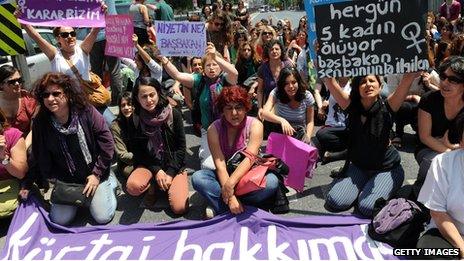Turkey PM Erdogan sparks row over abortion
- Published

Turkish feminists hold placards as they protest outside the Turkish Prime Minister's office in Istanbul
Turkey's Prime Minister Recep Tayyip Erdogan has described abortion as tantamount to "murder", angering women's rights groups and sparking an intense debate in the mainly Muslim nation.
In line with Mr Erdogan's comments, Turkey's health minister proposed a change in the abortion law, which rights groups fear could lead to a total ban.
Abortions became legal in 1983. According to 2008 figures, 10% of pregnancies in Turkey were terminated through abortion, far lower than the European average rate of 30%.
Speaking last week at a conference on population and development, Mr Erdogan said "there is no difference between killing a baby in its mother's stomach and killing a baby after birth".
"I consider abortion to be murder. No-one should have the right to allow this to happen."
Mr Erdogan also said he was "a prime minister that is against birth by caesarean" because "unnecessary" elective caesareans were "unnatural".
Mr Erdogan, who is known to advocate having large families, caused yet more anger when he compared abortion to the aerial bombardment of civilians.
"Every abortion is like an Uludere," he said - a reference to an incident last December in which 34 civilians were killed by the Turkish military in an air strike near the Iraqi border.
An investigation into the incident is still going on, with claims that the civilians were mistaken for Kurdistan Workers' Party (PKK) armed insurgents.
'Our womb'
Perhaps inevitably, Mr Erdogan received the backing of the Turkish parliament's human rights committee chairman, Ayhan Sefer Ustun.
Mr Ustun, who belongs to the ruling Islamist-rooted AKP (Justice and Development Party) of Mr Erdogan, said abortion should be banned as it constitutes "a crime against humanity".
"The notion that life begins after a few months is a grand delusion. We now need to rid society of this misconception. It also poses a danger to the mother's life."
But that was not the reaction from feminists and women's rights groups.
Habibe Yilmaz, lawyer and director of the Centre for Legal Support for Women, said "making a decision regarding one's own body... is a fundamental human right".
"Depriving women of this right would be tantamount to restricting her right to health and the right to live a fulfilling life."
The Istanbul Feminist Collective reacted angrily. It staged a sit-in outside the prime minister's office in Istanbul. Women held banners declaring "Murder is male violence, abortion is a choice!" and "Our womb, our life, our decision!"
Illegal practices
Next in line to reject Mr Erdogan's comments was Turkey's medical fraternity. The Turkish Medical Association (TTB) warned that restricting abortion would only encourage illegal practices, push women to use "primitive methods" to abort and increase maternal mortality.
"Prime Minister Erdogan's worries that the population will decrease and the nation will be wiped off the face of the Earth are baseless. Turkey's population will reach 90 million in 2050 without any additional arrangements," said TTB Secretary-General Feride Tanik.
The prime minister also faces international criticism. US-based Human Rights Watch has warned that restrictions on abortion would threaten "women's human rights to life, health, equality, privacy, physical integrity, and freedom of religion and conscience".
Change in law?
Meanwhile, Turkey's Health Minister Recep Akdag has said a draft law will be submitted next month that would restrict or ban abortions.
"I believe the law should prevent abortions as much as possible, except in cases when they are medically necessary. When making a decision, politicians will take into account both the scientific and moral aspects of the issue," he said.
In a reference to babies born as a result of rape, Mr Akdag said that the state would look after the babies if "the mother has been through something bad".
It is not clear what the draft bill would entail, but rights groups fear either a total ban or limiting abortions to four weeks after pregnancy. Current Turkish law allows abortions until the 10th week after conception.
New restrictions on abortion would not necessarily hurt Turkey's bid for EU membership, as some EU member states either ban abortion or set very strict conditions for it.
BBC Monitoring, external selects and translates news from radio, television, press, news agencies and the internet from 150 countries in more than 70 languages. It is based in Caversham, UK, and has several bureaux abroad. For more reports from BBC Monitoring, click here
- Published22 August 2023

- Published18 May 2012
